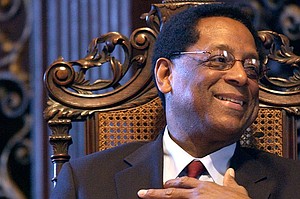7/17/2017

by Rachael Dane via news.harvard.edu
S. Allen Counter, the founding director of the Harvard Foundation for Intercultural and Race Relations and a noted neurophysiologist, educator, and ethnographer, died on July 12. According to wikipedia.com, Counter was also known for his achievements as an explorer. In 1971, he located a group of people living in the rain forest in northern Brazil, Surinam and French Guiana; the group was descended from African slaves who had escaped from slave ships. In 1986, Counter located descendants of earlier U.S. explorers of the arctic, Matthew A. Henson and Robert E. Peary. Counter was elected to The Explorers Club in 1989. Counter also designed Arthur Ashe‘s memorial at Woodland Cemetery in Richmond, Virginia, dedicated on what would have been Ashe’s 50th birthday on July 10, 1993.
“Harvard has lost a great champion of inclusion and belonging in Dr. Allen Counter,” said President Drew Faust. “Through his leadership of the Harvard Foundation, he advanced understanding among members of our community and challenged all of us to imagine and strive for a more welcoming University and a more peaceful world. We remember today a campus citizen whose deep love of Harvard, and especially our undergraduates, leaves a lasting legacy.”
“During my years as president of Harvard, no one did more than Allen to make minority students feel welcome and at home at Harvard, to promote fruitful interaction among all races, and to serve as understanding adults to whom many undergraduates could turn in order to register their concerns, answer their questions, and have their legitimate problems communicated to the Harvard administration so that they could be understood and acted upon in appropriate ways,” recalled Derek Bok, who led the University from 1971–91 and from 2006–07. “Much of what he accomplished was unrecognized, but his contributions were invaluable, and I will always feel a great debt of gratitude for his service to the University.”
Counter did his undergraduate work in biology and sensory physiology at Tennessee State University and his graduate studies in electrophysiology at Case Western Reserve University, where he earned his Ph.D. He earned his M.D. at the Karolinska Institute in Sweden. He came to Harvard in 1970 as a postdoctoral fellow and assistant neurophysiologist at Harvard Medical School and Massachusetts General Hospital. Early in his University career, Counter lived in a student residence hall as dormitory director, resident tutor, and biological sciences tutor.
In the early 1970s, the U.S. Secretary of Health, Education, and Welfare (now the Department of Health and Human Services) named him to the National Advisory Mental Health Council of the National Institute of Mental Health. In 1975, several proposals came before the council requesting funding for projects involving psychosurgery and electrode implants in human brains. At that time, the government’s rules protecting human subjects were still evolving, and Counter believed the projects were inherently racist. He insisted the council not approve them, and they were not acted upon.
In the same decade, Counter taught inmates at MCI Concord with the Massachusetts Correctional Concord Achievement Rehabilitation Volunteer Experience, where he said he gave inmates the same advice his grandmother had given him: “Read a book. Develop your mind.” A later study showed that participants in the program had a lower recidivism rate than prisoners who did not take part. After a sabbatical fellowship at UCLA with neuroscientist Alan D. Grinnell in the late 1970s, Counter returned to Cambridge, where his research at Harvard Medical School focused on clinical and basic studies on nerve and muscle physiology, auditory physiology, and neurophysiological diagnosis of brain-injured children and adults. Continue reading →
